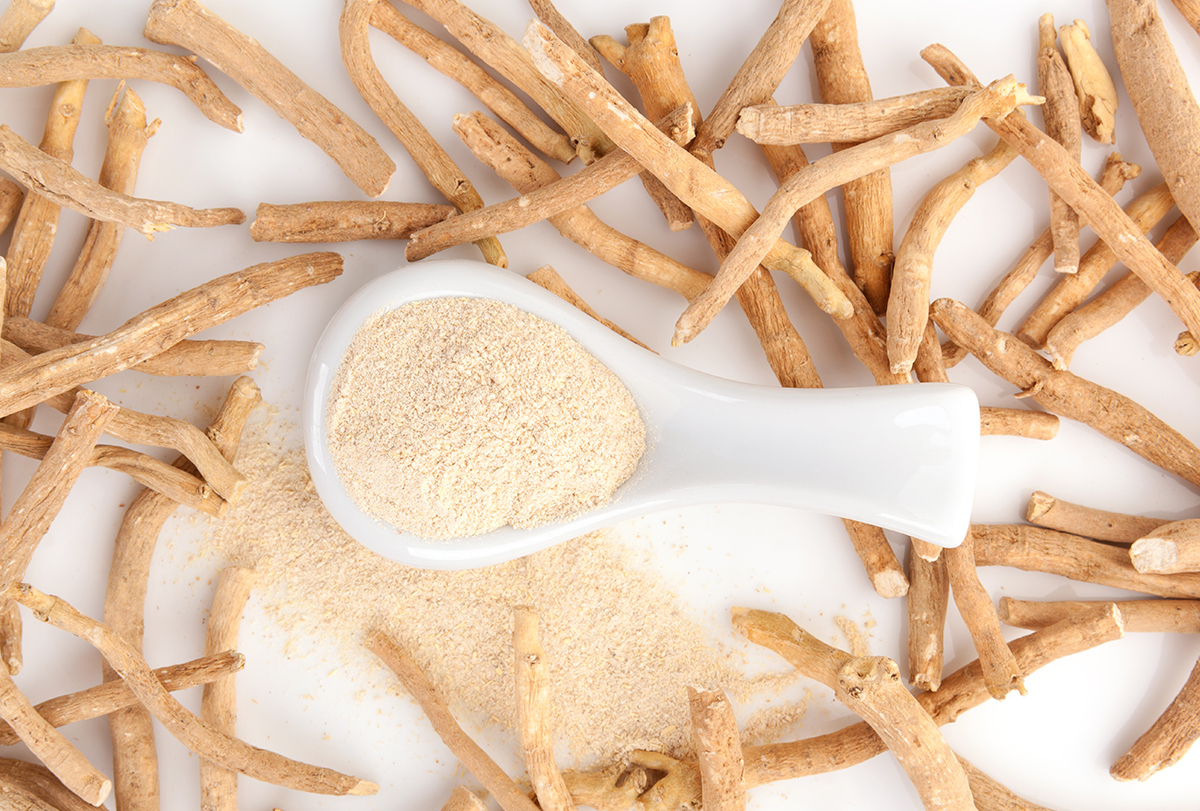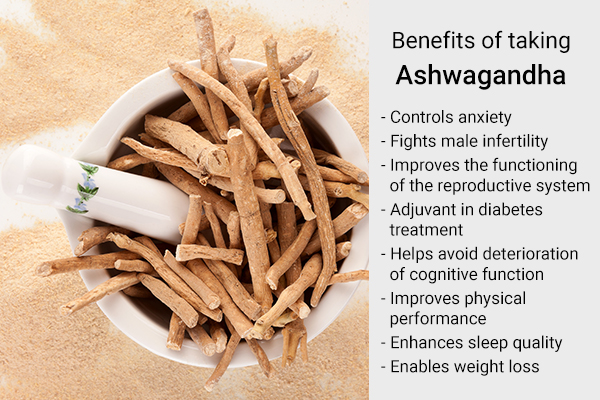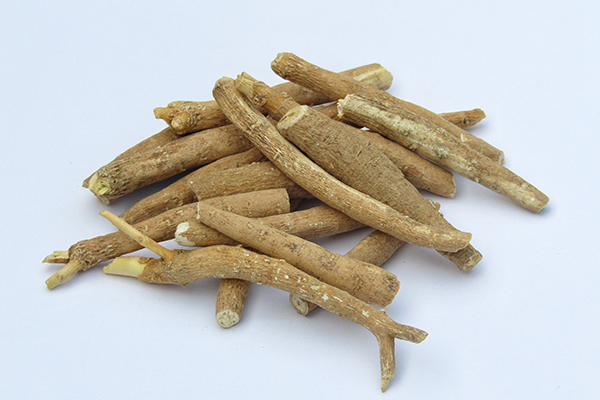In this article:
Ashwagandha (Withania somnifera) is an adaptogen that has been employed for a long time in conventional medicine systems such as Ayurveda.

Phytoadaptogens, or plant-derived adaptogens, are a category of herbal medication that is generally utilized by herbalists to help in lessening the adverse effects that chronic stress has on your health.
Ashwagandha, commonly known as Indian winter cherry or Indian ginseng, is one of the most crucial herbs in Ayurveda because of its broad range of health benefits. It is described as a rasayana, which is an herbal preparation that facilitates a youthful form of physical and mental health and boosts happiness. (1)(2)
You may be wondering about the best time to consume this magic drug. Is it best to take it in the morning or evening?
The truth is ashwagandha can be taken any time of the day, and the best time for you depends on your goals. Read on to know more.
Taking Ashwagandha in the Morning
It can take several weeks of consuming ashwagandha before you start to see its effects. Selecting when to take ashwagandha greatly relies on your personal preference and intended results.
To promote general health
Experts suggest that if you’re consuming ashwagandha as a part of your everyday supplement for promoting overall general health, you may want to take it in the morning along with all your other supplements.
To improve strength

Ashwagandha supplementation has a positive impact on muscular or aerobic performance. It can decrease total and low-density lipoprotein (LDL) cholesterol levels and improve muscle strength.
According to a 2018 study, a once-a-day 500 mg dose of ashwagandha taken in the morning for around 3 months (12 weeks) resulted in an improvement in upper-body and lower-body strength in volunteers. (3)
So, for increasing muscle strength, ashwagandha can be taken in the morning.
Note: Ashwagandha is deemed safe for consumption without any significant negative effects. However, taking very high doses of ashwagandha or taking it on an empty stomach may cause mild stomach discomfort in some people. Therefore, it is advised that you take ashwagandha after breakfast in the morning. (4)
Taking Ashwagandha at Night
To improve sleep quality
Sometimes, you wake up not feeling refreshed even after sleeping for an adequate number of hours. This type of sleep is called nonrestorative sleep (NRS), which affects 10% of the population globally. This leads to poor sleep quality and affects your body, resulting in physical and cognitive fatigue.
In 2020, a study established that 120 mg of ashwagandha taken 2 hours before going to sleep for 6 weeks was useful in enhancing overall sleep quality.
So, if you have sleep issues, you can take ashwagandha before going to bed at night. (5)
Taking Ashwagandha Twice a Day, Both Day and Night
To combat stress

Stress, anxiety, and hampered sleep have become a regular component of life in current times, and the use of herbs to counteract these issues and improve health outcomes has gained popularity in recent years.
Ashwagandha has been frequently employed to fight and decrease stress to improve general well-being. A 2019 study demonstrated that 125–300 mg of ashwagandha taken twice every day for 8 weeks (2 months) was efficacious for lessening stress. (1)
Another 2020 study showed that 300 mg of ashwagandha taken two times every day for 12 weeks improved mental alertness in older adults. So, for lowering your stress levels, you can take ashwagandha twice a day. (6)(7)
Note: It is best to talk to your doctor to know when to take ashwagandha and how much of it you need to get the desired results and benefits.
How Long Should You Take Ashwagandha to Reap Its Maximum Benefits?
The time it takes to reap the maximum benefits of ashwagandha can vary depending on the individual and their specific health goals.
Based on the findings of a 2020 study, taking 120 mg of ashwagandha 2 hours before going to sleep for 6 weeks may be beneficial in improving overall sleep quality. (5)
While a daily 500 mg of ashwagandha in the morning for approximately 3 months (or 12 weeks) enhanced upper-body and lower-body strength. (3) In general, most studies on ashwagandha have evaluated its effects over a period of 6–12 weeks.
Therefore, taking ashwagandha for at least these many weeks may be necessary to experience its full range of benefits.
Can You Take Ashwagandha for Life or for Just a Period?
While ashwagandha is generally considered safe for long-term use, there is no clear consensus on whether it should be taken for a lifetime or stopped after a certain period.
Some people may choose to take ashwagandha regularly as a part of their daily supplement regimen, while others may only take it for a specific period to address a particular health concern such as periods of anxiety or stress.
Therefore, it is recommended to consult a healthcare professional before regularly taking ashwagandha for an extended period.
Your healthcare provider can help you determine if ashwagandha is appropriate for your specific health needs and advise you on the best doses and duration of use.
What Are the Benefits of Taking Ashwagandha?

Several studies and reviews have showcased the following uses of ashwagandha: (8)(9)
- Controlling anxiety
- Fighting male infertility
- Improving the functioning of the reproductive system
- Adjuvant in diabetes treatment
- Avoiding deterioration of cognitive function
- Improving physical performance
- Enhancing sleep quality
- Enables weight loss
What Are Some Side Effects of Taking Ashwagandha?
Side effects are unusual and have not been specified. Although in some rare cases, ashwagandha can cause stomach upset, diarrhea, nausea, and vomiting, presumably due to the direct irritation of the intestinal lining. (4)
Most-Asked Questions About Consuming Ashwagandha
Can ashwagandha help me lose weight?
Psychological stress has been correlated to weight gain and obesity. Several investigations have demonstrated that ashwagandha has adaptogenic and stress-relieving properties, because of which it can help in weight loss. (9)
How long does ashwagandha take to work?
Ashwagandha can take more than 4 weeks to show results. (1)
Can women take ashwagandha?

Yes, both men and women can take ashwagandha.
Can ashwagandha be taken with water?
Yes, ashwagandha can be taken with water.
Can ashwagandha be taken with milk?
Yes, ashwagandha can be taken with milk. Take 1-2 teaspoons of ashwagandha powder, add it to a cup of warm milk, and drink it.
Can I take ashwagandha when I’m pregnant?
It is generally not recommended to take ashwagandha during pregnancy without first consulting with a healthcare professional.
Practical Takeaways
- Ashwagandha is a supplement that has a ton of health benefits and is primarily taken for improving sleep quality and relieving stress
- The time of day you choose to take ashwagandha won’t impact its effectiveness. So, you can take it during any time of the day.
- If you experience digestive problems when taking ashwagandha on an empty stomach, you should take it after food.
- Was this article helpful?
- YES, THANKS!NOT REALLY


